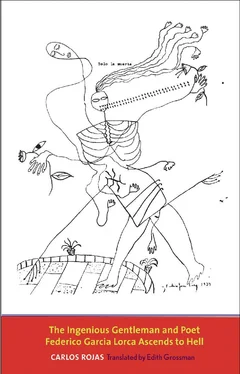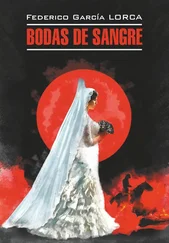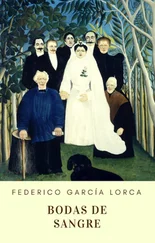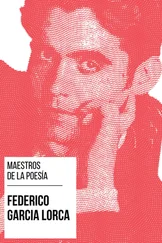PREPARE FOR YOUR TRIAL.
I don’t know whether I’m accused of having been born or having been murdered. I sense only that, whoever my judges may be, if I’m acquitted I’ll sleep in forgetfulness and be free of my memories.
PREPARE FOR YOUR TRIAL.
As soon as they appeared, those words on the window faded. They might have been fleeting, but I had no doubt I had seen them. How I would prepare for a trial, alone and not knowing the charges, struck me as grotesque and senseless. The absurdity of the situation filled me with an unexpected hilarity no less irrational than this supposed trial of mine. Twisted over an arm of my orchestra seat, I laughed wildly, like a madman, a mad dead man, my palms at my temples. I stopped laughing when I realized that if life and reason were exceptions lost in the firmament, this other universe too, the one of our spiral, could be just as pointless, just as alien to human consciousness. Therefore, once everything had been taken into account, I was still under the same constraints. I was being exhorted to prepare for a trial but not being told what crimes I was charged with. At the same time, by means of a design as obvious as it was inexplicable, I was infused with the certainty that acquittal would represent eternal forgetfulness, the limitless freedom of sleeping with no dreams and no memories.
Agitation suddenly brought me to my feet and took me up the corridor to the next theater. I was carried away by the presentiment, more than unjustified, that there I would find part of the answer to my uncertainty. As usual the theater was empty, on stage and in the seating area. And yet, for the first time, I was stopped by a sensation unknown in that place. I always believed that whoever stayed there rarely evoked his past, because I never saw his memories on stage. I even thought we dead were blind after all, like the ghost of that Gypsy girl of mine, because we saw only one another’s memories without being able to tell to whom they belonged. To add to my solitude, in that theater I didn’t even confront the man’s evocations. It was then, on one of my walks around the deserted theater, when I observed that each dead person was a Robinson Crusoe sitting on the head of a pin, taking on the entire guilty conscience of the universe.
For no reason, but with absolute certainty, at that instant I changed my mind and told myself that the auditorium, its proscenium and stage, all of it was empty. Whoever had been punished there had been acquitted at his trial. He slept now without dreams in hell, and for that reason, freed from consciousness and memory, he no longer was anyone. Never again would he turn his gaze to the shades of his past, and these would not appear again on stage. Immediately, and in an unconscious synthesis of terrifying realities, I thought that perhaps the spiral was not another universe the size of all humanity, where each dead person had a corresponding theater. It was conceivable that it had closed, while people still lived in the world with their foolishness and hope. Perhaps the seats and stages of those who had been acquitted and freed into nothingness, where not even memory exists, were waiting for other people and the staging of their memories.
Hypotheses entwined and knotted like threads. I was obliged to wonder whether some unknown but not inconsequential reason connected those who stayed in the same theater. It was possible that not having known one another on earth, secret analogies had governed their lives, and as a consequence they were assigned the same orchestra seats and identical stages. Perhaps, in the final analysis, an analysis as logical as it is ironic, that and only that was humanity’s reason for being. In contrast, and maybe with identical verisimilitude, I could imagine the opposite was true. In other words, suppose that irony was sarcasm, and attribute to senseless chance the successive passage of different ghosts through the same theaters. I was shaken by the idea of randomness so great that if I were acquitted at my trial, Ruiz Alonso would one day be assigned my space in hell so he could eternally watch my arrest in Granada.
It was this anticipatory, irrational fear — my theater and stage inherited by Ruiz Alonso — that took me up the corridor and under the skylights to the next theater. Again and as always, I called to someone there who I supposed was allied to me in feelings or in interests. “Who are you? Where do you come from? What was your name among men?” And now, for the first time I wanted to ask: “Who judges us? Why do they try the dead?” Only silence replied, harboring the echo of my questions. Perhaps the one chosen to fill that theater by himself was still alive, and his memories and fantasies preceded him along the road to the proscenium. At least, this was always my belief in the next theater, where the gigantic cross of the Risco de la Nava appears. Here, for arbitrary and inexplicable reasons, I was not as certain of my presentiment. In any event, if the man had died, we would not be able to meet in our sleeplessness, for we were incapable of hearing or seeing one another in the theater or along this corridor that curves and moves up the endless spiral.
Regardless of whether his memories preceded him, they began suddenly to illuminate the stage. Where once there had been a parade of gentlemen in top hats, monarchs with ruffs around their necks, storks flying over Baltic cities, white-skinned ladies with their hands in muffs, sleepy elves, herds of reindeer gleaming with frost, hunters huddled over the pot of eucalyptus, fishermen with green eyes, Aretino’s double, the thirteen twins around Blasco Ibáñez’s table, the prostitute whose face was crossed by a whip, fields of fennel and thyme covered by bees, and the enlightened nude who was the ragione chiara acclaimed by the musketeers, there now appeared the glass front of the Lyon across from the Post Office, its window overlooking the sidewalk of Calle de Alcalá. The café had changed very little since the days when I would sit there with Buñuel or Alberti, after the theater. The same sofas leaning against the wall, which at first were made of plush and then of oilcloth. The same bar covered in zinc and marble, in front of the same shelves of illuminated bottles. Identical tables and chairs in the usual places. Two men were talking beside the window at the entrance, but their voices came through the glass very clearly. One was tall and must have measured a good two meters, as the peasants of my childhood used to say. He wore his pitch-black hair brushed back, flat against his skull. The scar from an accident or a knife blade divided his cheek, darkened by the sun and bluish because of his beard. From time to time he wrote in a notebook lying open on the table or toyed with an aluminum ashtray. He was a stranger to me and could have been any age, between mine when they shot me and plunged me into hell, and fifty.
The other man must have been close to eighty or perhaps older. He had reached that point in elderliness when people stop aging and turn into their own vanished likeness. I couldn’t identify him until I heard his voice. With a disengaged coldness that did not fail to surprise me, I realized he would be someone I knew very well. His cottony kinky hair was thinning now, and his angular, large-jawed features had grown smaller around his dark eyes. His shoulders too, which once seemed to belong to a stevedore or a large, husky man, were collapsing, defeated by the years. His hands, stained by time with liver spots, rubbed the space between his eyebrows or stopped with the edge of his palm a yellow dribble that kept appearing at the corner of his mouth. It was Ramón Ruiz Alonso.
They were talking about me, even though they made a curious effort, as if by mutual agreement, not to ever mention me by name. The man with the scar on his cheek nodded occasionally at Ruiz Alonso’s words with a vague gesture, almost for the sake of courtesy. Most of the time he seemed to listen without believing most of what Ruiz Alonso was telling him. They never looked each other in the eye, but they were absorbed in their conversation. Two cups of coffee grew cold on the table.
Читать дальше












